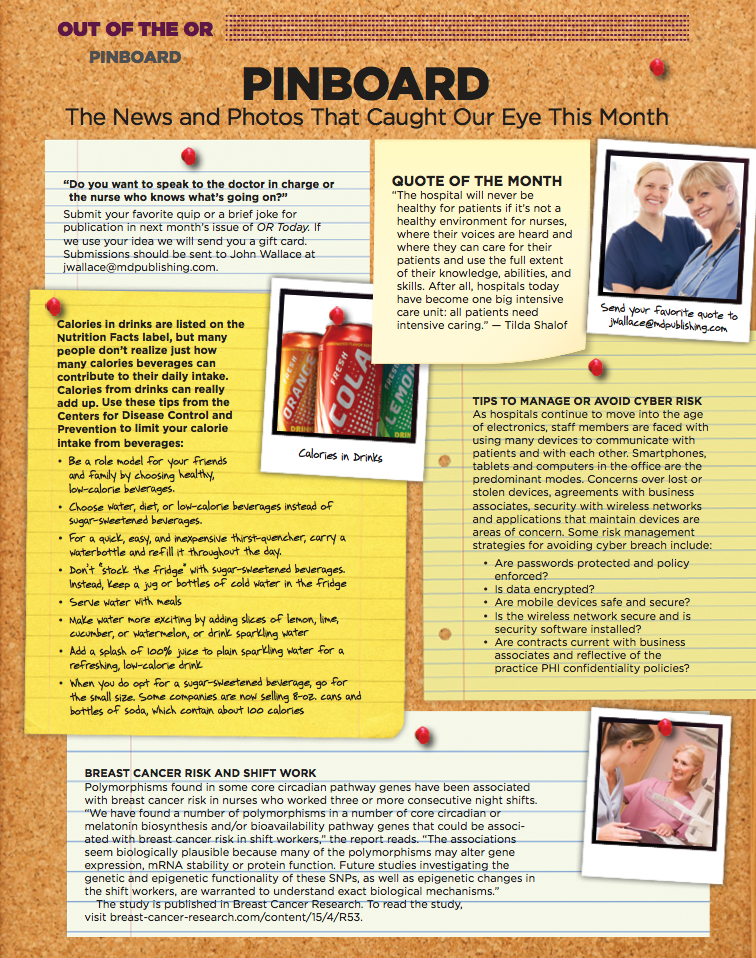
Quote of the month
“The hospital will never be healthy for patients if it’s not a healthy environment for nurses, where their voices are heard and where they can care for their patients and use the full extent of their knowledge, abilities, and skills. After all, hospitals today have become one big intensive care unit: all patients need intensive caring.” — Tilda Shalof
“Do you want to speak to the doctor in charge or the nurse who knows what’s going on?” Submit your favorite quip or a brief joke for publication in next month’s issue of OR Today. If we use your idea we will send you a gift card. Submissions should be sent to John Wallace at jwallace@mdpublishing.com.
Calories in drinks
Calories in drinks are listed on the nutrition facts label, but many people don’t realize just how many calories beverages can contribute to their daily intake. calories from drinks can really add up. Use these tips from the Centers for Disease Control and Prevention to limit your calorie intake from beverages:
• Be a role model for your friends and family by choosing healthy, low-calorie beverages.
• Choose water, diet, or low-calorie beverages instead of sugar-sweetened beverages.
• For a quick, easy, and inexpensive thirst-quencher, carry a waterbottle and refill it throughout the day.
• Don’t “stock the fridge” with sugar-sweetened beverages. Instead, keep a jug or bottles of cold water in the fridge
• Serve water with meals
• Make water more exciting by adding slices of lemon, lime, cucumber, or watermelon, or drink sparkling water
• Add a splash of 100% juice to plain sparkling water for a refreshing, low-calorie drink
• When you do opt for a sugar-sweetened beverage, go for the small size. Some companies are now selling 8-oz. cans and bottles of soda, which contain about 100 calories
Tips to manage or avoid cyber risk
As hospitals continue to move into the age of electronics, staff members are faced with using many devices to communicate with patients and with each other. Smartphones, tablets and computers in the office are the predominant modes. Concerns over lost or stolen devices, agreements with business associates, security with wireless networks and applications that maintain devices are areas of concern. Some risk management strategies for avoiding cyber breach include:
• Are passwords protected and policy enforced?
• Is data encrypted?
• Are mobile devices safe and secure?
• Is the wireless network secure and is security software installed?
• Are contracts current with business associates and reflective of the practice PHI confidentiality policies?
Breast cancer risk and shift work
Polymorphisms found in some core circadian pathway genes have been associated with breast cancer risk in nurses who worked three or more consecutive night shifts. “We have found a number of polymorphisms in a number of core circadian or melatonin biosynthesis and/or bioavailability pathway genes that could be associated with breast cancer risk in shift workers,” the report reads. “The associations seem biologically plausible because many of the polymorphisms may alter gene expression, mRNA stability or protein function. Future studies investigating the genetic and epigenetic functionality of these SNPs, as well as epigenetic changes in the shift workers, are warranted to understand exact biological mechanisms.”
The study is published in Breast Cancer Research. To read the study, visit breast-cancer-research.com/content/15/4/R53.







